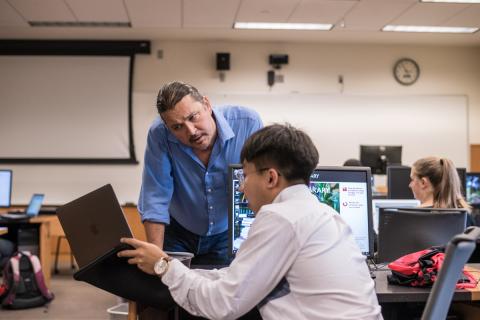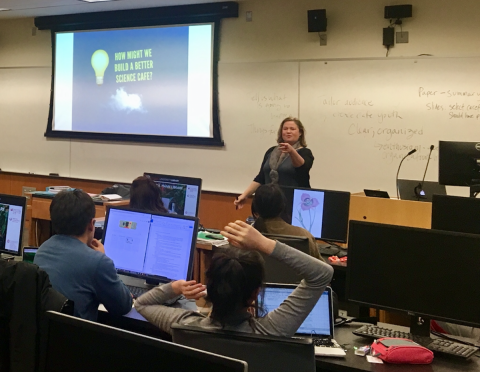Course Dates
June 16, 2025 to June 30, 2025
Course Description
Sharing scientific discoveries with the public is no longer solely the job of professional communicators, rather a skill that all scholars should have. This course leads students through a series of hands-on science communication experiences and provides practical experience in approaches for engaging both scientific and non-scientific audiences. Students fill their science communication “tool box,” as being introduced to video production, podcasts, Wikipedia editing, public science events, social media platforms, blogging, and press release writing. They will receive feedback from their peers and the instructors with the goal of helping all members of the class to become effective science communicators.
Students enrolled in the course will have an amazing opportunity to learn the skills required for science communication by tapping into the local resources, such reaching out to local fisherman and natural resource managers. At any given point in time there are many active research programs on the island and students will have access to write stories, create videos and radio podcasts and others forms of media on the research being conducted at SML.
By the end of this course, students will:
- Demonstrate how to engage the public in a scientific dialogue using a science communication strategy plan.
- Learn how to translate scientific journal articles into easily consumable content for the public.
- Gain hands-on experience with digital communication platforms and learn how to prepare information suitable for those platforms
- Understand and apply the components of science literacy.
- Improve their critical thinking skills as they analyze and evaluate potential media information sources. By doing so, students will gain a deeper appreciation for how information is produced and consumed.
- Develop skills necessary for today’s education and tomorrow’s employment.
"In this course, I want students to learn the importance of being well-rounded scientists who can communicate their work effectively and translate information through storytelling.” - Dr. Sarvary in a recent Cornell Chronicle feature about his on-campus Science Communication course.
Status
Course Numbers
Cornell: BIOSM 3500 (3 Credits)
UNH: MEFB 505 (4 Credits)
Faculty
Dr. Mark Sarvary

Director of the Investigative Biology Teaching Laboratories, Cornell University
Dr. Sarvary received his Master’s diplomas in ecology and in economics in Hungary. After attending the University of Minnesota in Saint Paul, MN and conducting research at the University of California in Davis, CA, he received his Ph.D. at Cornell University in 2007. He returned to Cornell in 2011 to take on a faculty position at the Department of Neurobiology and Behavior.
As a Director of the Investigative Biology Teaching Laboratories at Cornell, he teaches critical thinking, experimental design, and science communication through modules in ecology, genetics, and microbiology. As a strong advocate of public engagement, he is a public science advisor of a local Science Café, he is a faculty advisor of the undergraduate medical and life sciences debate club, and has taught a course on how to use Wikipedia to convey scientific information. He attended the Alan Alda Center for Communicating Science boot camp and is a co-producer of a science podcast called Locally Sourced Science at an Ithaca radio station.
Ms. Kitty Gifford

Instructor, Applied Science Communication, Cornell University
Kitty Gifford works in the field of integrated marketing communications in Ithaca, NY. She helps clients with digital communications strategies using a mixture of online tools and social networking sites. She has worked in the industry for five years at a design and advertising agency serving as director of social and digital strategy. Previously she was on the project staff in the Citizen Science department at the Cornell Lab of Ornithology where she launched social network platforms and fielded thousands of breeding bird biology questions. She received her undergraduate degree from Humboldt State University, where she majored in Biology and Environmental Science. She received her M.S. in Communications from the S.I. Newhouse School of Public Communications at Syracuse University.
